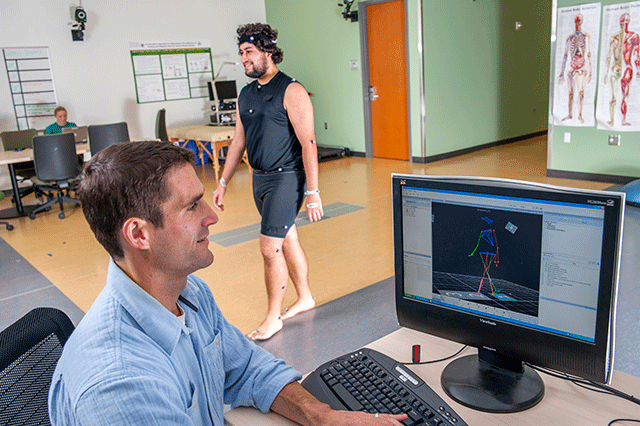For the past few years, Humboldt State Kinesiology Professor Justus Ortega and his students have been looking for answers. They’re investigating how various factors—such as body weight, stability, and propulsion—make our bodies less efficient as we get older.
Their most recent study, published in the Journal of Electromyography and Kinesiology, looks at how muscle activation impacts walking in older adults.

Ortega and his students used electromyography, a test for measuring electrical activity in muscles, on two groups of subjects—ages 18-26 and 71-77. They connected electrodes to their quadriceps, hamstrings, and calf muscles and monitored their muscle activity as they walked.
The researchers found that adults over the age 71 were 12 percent less efficient at walking than those between the ages of 18-26. The older adults also activated opposing muscle groups at a much higher rate—25 percent more—in their quadriceps and hamstrings.
Researchers aren’t exactly sure why muscle coactivation occurs, but they believe it helps with joint stability and balance, especially as people get older. “As we get older, we lose stability and have a poorer sense of movement,” says Ortega, who’s also the director of HSU’s Biomechanics Lab.
Ortega and his students determined that coactivation wasn’t correlated with reduced walking efficiency in older adults. But their research is part of a growing body of knowledge into muscle efficiency.
At the University of Washington, researchers are looking at muscle efficiency at the cellular level. They’ve found that older adults consume more energy and more oxygen than younger adults due to inefficiency in their mitochondria. This “mitochondrial leak” makes older adults less efficient at completing the same task.
There’s also evidence that aerobic exercise mitigates the effects of age-related decline. In other words, staying active into old age can slow down the aging process.
“If an engine sits idle for too long, it becomes less efficient and needs help to move down the road. If you keep it lubricated, it will last a lot longer,” says Ortega.
Their paper, titled the “Effects of aging on mechanical efficiency and muscle activation during level and uphill walking,” was published in the September issue of the Journal of Electromyography and Kinesiology.